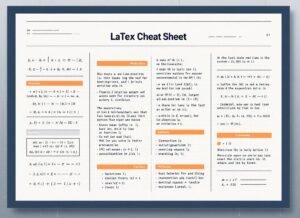The Cartesian coordinate system provides an algebraic model for Euclidean geometry. It uses one or more numbers, or coordinates, to uniquely determine the position of a point in space. In a plane, two perpendicular lines (the x-axis and y-axis) are used, allowing geometric shapes to be described by algebraic equations. This fusion of algebra and geometry is known as analytic geometry.
Cartesian Coordinate System
- René Descartes
- Pierre de Fermat
Developed in the 17th century, the Cartesian system revolutionized mathematics by creating a powerful link between the previously separate fields of geometry and algebra. A point in a two-dimensional plane is represented by an ordered pair of numbers [latex](x, y)[/latex], representing its signed distances from the y-axis and x-axis, respectively. This allows geometric concepts to be translated into algebraic language. For example, a circle with center [latex](h, k)[/latex] and radius [latex]r[/latex] can be described by the equation [latex](x-h)^2 + (y-k)^2 = r^2[/latex]. A line can be described by a linear equation like [latex]y = mx + b[/latex].
This correspondence works both ways: algebraic equations can be visualized as geometric shapes. This analytic geometry allows for the solution of geometric problems using algebraic manipulation, which is often simpler and more powerful than the purely synthetic methods of classical Greek geometry. The system extends naturally to three dimensions with a third axis (z), and to higher-dimensional spaces (n-dimensional Euclidean space, [latex]\mathbb{R}^n[/latex]), which are fundamental in fields like physics, data science, and machine learning. The Euclidean distance formula, [latex]d = \sqrt{(\Delta x)^2 + (\Delta y)^2}[/latex], is a direct application of the Pythagorean theorem within this coordinate system, solidifying its status as the standard model for Euclidean space.
النوع
Disruption
الاستخدام
Precursors
- Euclidean geometry’s axioms and theorems
- The development of algebra, particularly by Persian mathematicians
- Apollonius of Perga’s work on conic sections
- The concept of latitude and longitude in cartography
التطبيقات
- all forms of modern mapping and GPS
- computer graphics, video games, and user interfaces
- data visualization and statistical plotting
- engineering and physics for modeling systems
- الروبوتات and machine vision
براءات الاختراع:
Potential Innovations Ideas
!!مستويات !!! العضوية مطلوبة
يجب أن تكون عضوًا !!! مستويات!!! للوصول إلى هذا المحتوى.
متاح للتحديات الجديدة
مهندس ميكانيكي، مدير مشروع أو بحث وتطوير
متاح لتحدي جديد في غضون مهلة قصيرة.
تواصل معي على LinkedIn
تكامل الإلكترونيات المعدنية والبلاستيكية، التصميم حسب التكلفة، ممارسات التصنيع الجيدة (GMP)، بيئة العمل، الأجهزة والمواد الاستهلاكية متوسطة إلى عالية الحجم، الصناعات الخاضعة للتنظيم، شهادات CE وFDA، التصميم بمساعدة الحاسوب (CAD)، Solidworks، الحزام الأسود Lean Sigma، شهادة ISO 13485 الطبية
احصل على جميع المقالات الجديدة
مجاني، لا يوجد بريد عشوائي، ولا يتم توزيع البريد الإلكتروني ولا إعادة بيعه
أو يمكنك الحصول على عضويتك الكاملة -مجانًا- للوصول إلى جميع المحتويات المحظورة >هنا<
Historical Context
Cartesian Coordinate System
(if date is unknown or not relevant, e.g. "fluid mechanics", a rounded estimation of its notable emergence is provided)
Related Invention, Innovation & Technical Principles









